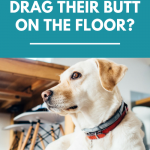[ad_1]
Does your dog drag his butt on the floor? You’re not alone, it’s a fairly common behavior. It’s called scooting, and chances are if you have a dog you’ve seen it at least once or twice. And who among us doesn’t love it when our dog scoots across the floor when we’ve got company over.
This article goes over the most common causes for scooting, how to identify the underlying issue, and some steps you can take to prevent it.
Why Do Dogs Drag Their Butts on the Floor?
Have you noticed your dog dragging their butt across the floor or grass? It’s called scooting, and it’s a fairly common behavior in dogs that can have various causes. Dogs drag their butt on the floor due to irritation, and the cause of that irritation ranges from inflammation to infection. The most common reasons for anus irritation in dogs include:
- Anal gland issues
- Tapeworms
- Excess fecal matter
- Allergies
And although watching your dog drag their butt across your carpet isn’t desirable it’s important not to punish them — they’re doing it because they’re uncomfortable. Figuring out what’s causing the irritation can be tricky, but once you do you’ll be able to alleviate their discomfort and prevent them from scooting.

There’s a meme for everything… via memeshelf
Anal Gland Issues Can Cause Irritation & Scooting
Anal glands (also referred to as anal sacs) becoming full is the most common reason for dogs scooting their butts on the floor. It’s not the most pleasant issue to talk about, but anal gland issues are fairly common and affect many pets.
Anal glands are a pair of sacs located on either side of your dog’s anus. The sacs are lined with oil & sweat glands, and the fluid they secrete is quite pungent. One of the first symptoms dogs exhibit when an anal sac becomes impacted is scooting their butts on the floor.
Some dogs are prone to getting impacted anal glands, often due to a thicker fluid that’s unable to pass to the outside. This can lead to the sac becoming infected and causing a lot of pain and irritation, and if left unattended can require surgery to fix.
If you suspect your dog may have an anal gland issue consult your veterinarian. Technically you can empty your dog’s anal glands yourself, but if you’ve never done it before have your veterinarian teach you how to perform the procedure. They can also check to make sure there’s no other underlying issues going on.
Tapeworms Can Cause Dogs to Drag Their Butts on the Ground
Another common reason why dogs drag their butts on the ground is tapeworms. Tapeworms are acquired by ingesting an infected host, and when it comes to dogs that’s usually a flea.
One of the symptoms of tape worms is scooting their butt across the floor due to the irritation that tapeworm segments cause to the area. Worms mature in your dog’s intestines, and tapeworm segments can cause irritation as they exit through your dog’s anus. The segments are small, but upon close examination you may be able to spot them around your dog’s rear end (they look like tiny little white or golden colored pieces of rice).
Tapeworm segments are only passed intermittently and therefore are often not diagnosed on routine fecal examination. If you find any segments, white or golden color, bring them to your veterinarian for a definitive diagnosis. – VCA Animal Hospitals
If you suspect your dog has tapeworms consult your veterinarian. After making a proper diagnosis they can prescribe a de-worming treatment.
Excess Fecal Matter Can Cause Your Dog to Drag His Behind on the Ground
Excess fecal matter that gets stuck around your dog’s rear end is another reason why dogs drag their butts on the ground. Referred to as Canine Pseudocoprostasis (or dingleberries), fecal matter that gets stuck on or hangs from the fur surrounding your dog’s anus can cause your dog to scoot his butt on the floor in order to shake it loose.
In long haired dogs this can become a chronic condition, and prevention is the best method for managing it. If the hair around your dog’s butt is trimmed it’s much less likely to get stuck in the hair. When left untreated the matting can make it harder for your dog to poop, and complete obstruction of the anus can occur.
Allergies Can Cause Irritation That Leads to Scooting
Skin irritation caused by allergies can cause your dog to drag their butt on the floor. Allergic reactions to food, fleas or other environmental substances can cause a lot of irritation — including to your dog’s rear end. Some of the most common dog allergies include:
- Food
- Fleas
- Cigarette smoke
- Pollens
- Mold Spores
- Medications
Some allergies may be easy to identify — such as a diet change or flea infestation — but others, such as environmental substances like dust or pollen, may be trickier to identify. If you think your dog may have allergies but aren’t sure what’s causing them check with your veterinarian for help determining what’s causing your dog’s allergies.
How to Reduce Your Dog’s Scooting
While scooting itself isn’t a medical emergency it is a behavior that warrants investigation. Dog’s scoot when their rear end is irritated, so unless you address the cause of that irritation your dog is going to continue to scoot to help alleviate their discomfort.
If you can’t figure out what’s causing your dog’s rear end to become irritated it’s time to consult your veterinarian. Identifying and managing the underlying issue will prevent your dog from scooting, and best of all it’ll make your dog feel a whole lot better.

Please share with your friends 🙂


